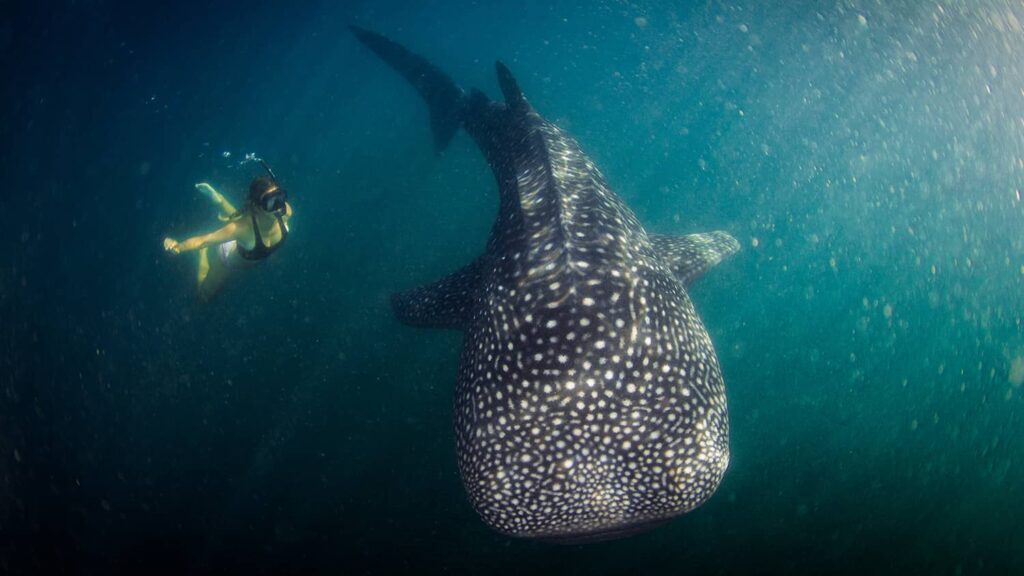When it comes to marine life, few creatures capture the imagination quite like the whale shark. Known as the gentle giants of the ocean, these magnificent creatures can be found in various locations around the world, but one of the most enchanting places to encounter them is Saleh Bay in Indonesia. This article will take you on a journey to explore the whale sharks of Saleh Bay, their habitat, conservation efforts, and how you can responsibly experience these incredible animals.
The Allure of Whale Sharks
Whale sharks (Rhincodon typus) are the largest fish in the ocean, reaching lengths of up to 40 feet or more. Despite their size, they are known for their docile nature and are harmless to humans. These gentle giants primarily feed on plankton, small fish, and other tiny marine organisms, making them a fascinating subject for marine enthusiasts and divers alike.
Why Saleh Bay?
Located on the western coast of Sumbawa Island, Saleh Bay is a hidden gem that offers a unique opportunity to swim with whale sharks. The bay’s warm, nutrient-rich waters create an ideal environment for these magnificent creatures, attracting them to the area throughout the year. The combination of stunning underwater landscapes and the chance to observe whale sharks in their natural habitat makes Saleh Bay a must-visit destination for eco-tourists and marine life lovers.
The Whale Shark Experience
Swimming with Giants
One of the most thrilling experiences you can have in Saleh Bay is swimming alongside whale sharks. Local tour operators offer guided excursions that allow you to safely enter the water and observe these gentle giants up close. The experience is both exhilarating and humbling, as you glide through the water, watching the whale sharks gracefully swim by.
Responsible Tourism
While the allure of swimming with whale sharks is undeniable, it is essential to approach this experience with a sense of responsibility. The whale sharks of Saleh Bay are a vital part of the marine ecosystem, and their conservation is crucial for maintaining the health of the ocean. Tour operators in the area are increasingly adopting ethical practices to ensure that interactions with whale sharks are sustainable and do not harm the animals or their habitat.
Guidelines for Ethical Interaction
- Choose Responsible Operators: When selecting a tour operator, look for those that prioritize ethical practices and have a good reputation for conservation efforts. They should follow guidelines that minimize disturbance to the whale sharks.
- Maintain a Safe Distance: While it may be tempting to get close to these magnificent creatures, it is essential to maintain a respectful distance. This helps reduce stress on the whale sharks and allows them to behave naturally.
- Limit the Number of Divers: Smaller groups are less likely to disturb the whale sharks. Choose tours that limit the number of participants to ensure a more intimate and respectful experience.
- Avoid Touching: Whale sharks have sensitive skin, and touching them can cause harm. Observing from a distance is the best way to appreciate their beauty without causing distress.
- Educate Yourself: Before embarking on your adventure, take the time to learn about whale sharks, their behavior, and their role in the marine ecosystem. Understanding these creatures will enhance your experience and promote conservation awareness.
Conservation Efforts in Saleh Bay
The whale sharks of Saleh Bay are not only a tourist attraction but also a vital part of the local ecosystem. Conservation efforts are underway to protect these gentle giants and their habitat. Local communities, NGOs, and government agencies are working together to promote sustainable tourism practices and raise awareness about the importance of marine conservation.
Community Involvement
Local fishermen and communities have recognized the value of whale sharks as a sustainable resource for eco-tourism. By participating in conservation efforts, they can benefit economically while protecting their marine environment. This shift in perspective has led to the establishment of marine protected areas and regulations that help safeguard the whale sharks and their habitat.
Research and Monitoring
Ongoing research and monitoring programs are essential for understanding the behavior and population dynamics of whale sharks in Saleh Bay. By collecting data on their movements, feeding habits, and breeding patterns, scientists can develop effective conservation strategies to ensure the long-term survival of these magnificent creatures.
Planning Your Visit
If you’re ready to embark on an unforgettable adventure to see the whale sharks of Saleh Bay, here are some tips to help you plan your trip:
- Best Time to Visit: Whale sharks can be spotted in Saleh Bay year-round, but the peak season typically runs from May to September. During this time, the chances of encountering these gentle giants are significantly higher.
- Getting There: Saleh Bay is accessible by boat from various points on Sumbawa Island. The nearest airport is in Bima, which is well-connected to major cities in Indonesia.
- Accommodation: There are several accommodation options available in the area, ranging from budget guesthouses to more luxurious resorts. Choose a place that aligns with your travel style and budget.
- What to Bring: Don’t forget to pack your snorkeling gear, sunscreen, a hat, and a waterproof camera to capture the incredible moments you’ll experience while swimming with whale sharks.
The whale sharks of Saleh Bay offer a unique and unforgettable experience for those seeking to connect with nature. By approaching this adventure with a sense of responsibility and respect for these magnificent creatures, you can contribute to their conservation while enjoying the beauty of the marine world. So, gear up for an adventure of a lifetime and immerse yourself in the wonders of Saleh Bay, where the gentle giants of the ocean await!


